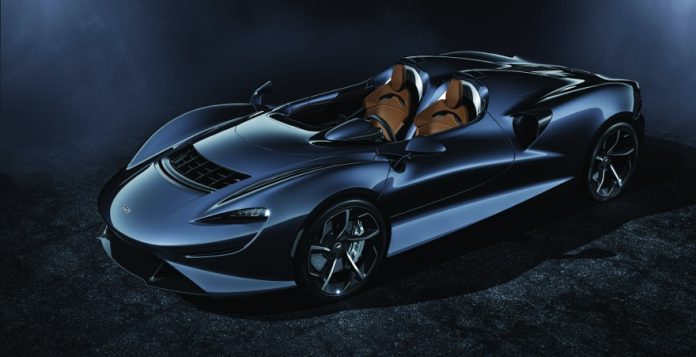There are cars, then there are McLarens, then there is the Elva. Even for such a company, this is a new kind of amazing.
By Guilherme Marques

The McLaren Elva is the latest model in the Ultimate Series of cars, the most exclusive, most spectacular models built by the British manufacturer, where already sit the P1, the Senna and the Speedtail.
Now, McLaren have shown an even more outlandish proposal, called the Elva, their first open-cockpit road car. Built in very limited numbers – only 399 units – the Elva is set to be a landmark car in the history of McLaren. It was developed to celebrate the M1A and the three Elva M1A designed by Bruce McLaren in the Sixties, which were basically customer versions of the Group 7 McLaren competition cars.

Mike Flewitt, CEO of McLAren Automotive, is adamant in his view of what a McLaren should be: “McLaren continues to push the boundaries of supercar and hypercar development in pursuit of outstanding and unparalleled driving experiences for our customers and the McLaren Elva epitomises that pioneering spirit. The McLaren-Elva M1A [Mk1] and its successors are in many ways the true spiritual forerunners of today’s McLarens – superlight, mid-engined cars with the highest levels of performance and dynamic excellence. It’s fitting that the new McLaren Ultimate Series roadster – a uniquely modern car that delivers the ultimate connection between driver, car and the elements and with that new heights of driving pleasure on road or track – acknowledges our rich heritage with the Elva name.”
McLaren have been shaking the waters in the supercar market, making use of a name with a rich and glorious history and applying it to a catalogue of cars that in under a decade’s time reached the upper echelons of their segment. The Elva is arguably the most incredible model since the MP4-12C met the light of day in 2011 and introduced McLaren Automotive as a series production car constructor.

The Elva is n extreme two-seater with a bespoke carbon-fibre chassis and body. It boasts no windscreen, no doors and no roof. Practical considerations were simply not taken into consideration in this car’s briefing. It is all about driving pleasure and the heightening of every emotion behind the wheel, either on the road or on the track.
The Elva, much like every other McLaren, comes with a 4.0-litre, twin-turbocharged V8, in a barely believable tune of 815 horse power and 800 Nm of torque. It features a flat-plane crankshaft, dry-sump lubrication and lightweight connecting camshafts, rods and pistons that reduce mass in the powertrain. Power is directed to the rear wheels through a seven-speed seamless-shift gearbox, and working in conjunction with a launch control function, the performance is breathtaking: 100km/h from a standstill is reached in less than three seconds, while the McLaren Elva is quicker than the McLaren Senna to 200km/h at just 6.7 seconds.
The increased power output comes from an optimized exhaust system built out of lightweight materials, such as titanium and Inconel. In a first for McLaren, the exhaust was developed using 3D printing technology, the only possible way to achieve the shape desired by the engineers.
In terms of chassis, it is tuned to maximize the driving experience and not to achieve lap times. From Andy Palmer, the Elva’s Production Line Director: “The McLaren Elva is a true Ultimate roadster; it exists purely for the pleasure of driving, to deliver an enthralling and immersive experience born from the ultimate connection between the car, the driver and the elements. The lightest road car we’ve ever built at McLaren Automotive, the Elva is incredibly agile and ferociously fast, its 815PS twin-turbocharged V8 engine providing breathtaking performance.”

Obviously, beyond any performance considerations, the Elva looks like a spaceship that has just landed, not so much a car. No one will look at an Elva and think how fast it is or how well it goes around a corner; everyone, no exceptions, will go speechless at the way it looks. The Elva exists so it can look like it does. The market already knew McLaren could build super fast cars; what we didn’t know was that they could risk something like this. The appearance of the Elva is as striking as it is unique – but it is also a testament to a company that is so sure of itself that it can expand itself to a project of this nature.
Customers can personalise their vehicles according to its intended use. McLaren have created a series of trims dedicated to an open-cockpit car and realistically, from the 399 that will be produced, it is possible that no two are alike. There is no audio system as standard, although it can be specified, along with semi-slick tyres, super lightweight wheels and a lift system if you are planning on driving into town in a car with no windscreen and with a helmet on (mandatory on some countries). Extreme customization is taken up by McLaren Special Operations, where options are as big as the imagination.
In England, the Elva is priced at £1,425,000, making it the most expensive McLaren Automotive ever made. That makes sense, because it is also the most incredible, otherworldly idea they have ever had.


























